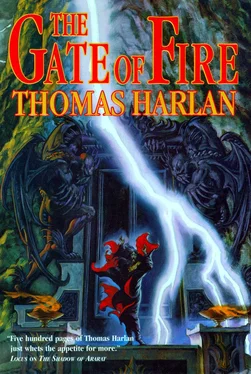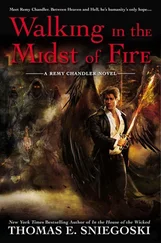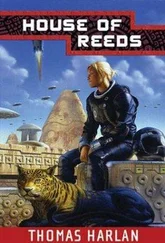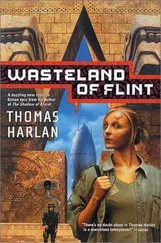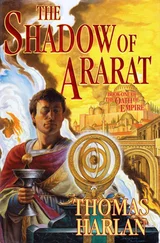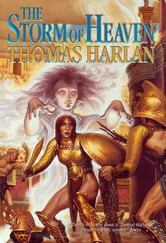Thomas Harlan - The Gate of fire
Здесь есть возможность читать онлайн «Thomas Harlan - The Gate of fire» весь текст электронной книги совершенно бесплатно (целиком полную версию без сокращений). В некоторых случаях можно слушать аудио, скачать через торрент в формате fb2 и присутствует краткое содержание. Жанр: Фэнтези, на английском языке. Описание произведения, (предисловие) а так же отзывы посетителей доступны на портале библиотеки ЛибКат.
- Название:The Gate of fire
- Автор:
- Жанр:
- Год:неизвестен
- ISBN:нет данных
- Рейтинг книги:4 / 5. Голосов: 1
-
Избранное:Добавить в избранное
- Отзывы:
-
Ваша оценка:
- 80
- 1
- 2
- 3
- 4
- 5
The Gate of fire: краткое содержание, описание и аннотация
Предлагаем к чтению аннотацию, описание, краткое содержание или предисловие (зависит от того, что написал сам автор книги «The Gate of fire»). Если вы не нашли необходимую информацию о книге — напишите в комментариях, мы постараемся отыскать её.
The Gate of fire — читать онлайн бесплатно полную книгу (весь текст) целиком
Ниже представлен текст книги, разбитый по страницам. Система сохранения места последней прочитанной страницы, позволяет с удобством читать онлайн бесплатно книгу «The Gate of fire», без необходимости каждый раз заново искать на чём Вы остановились. Поставьте закладку, и сможете в любой момент перейти на страницу, на которой закончили чтение.
Интервал:
Закладка:
"To me," he croaked, finding his throat constricted and dry. "To me, Sahaba!"
– |The kings of Nabatea had raised a fine temple at the center of their city. It held echoes of the Greeks, with long lines of columns carrying understated capitals and a pitched roof. Unlike the other buildings that crowded the valley floor, however, each course of fine-cut stone was separated from the others by a layer of wooden spacers. Where earthquakes had damaged the other buildings over the centuries, or even cast down the Temple of the Winged Lions in ruin, the great temple stood, serene and intact. It stood at the heart of the city, where three streams joined at the western end of the valley. A hill rose behind it, covered with villas and houses with flat roofs. The buildings that flanked it were raised up in the same red sandstone as the rest of the valley, but inset panels lined the walls, covered with painted carvings. Kings and heroes stared out of the stone, frozen in their moment of triumph. A grand Roman theater also graced the city, but it could not compare with the elegant beauty of the massive temple.
Mohammed had taken it as his residence while he remained at Petra. The statues had been covered, for the moment, with burlap and the fires of sacrifice put out. An iron chair with a padded cushion served him as a throne, though in no way did he think of himself as a king. All those notables of the city who had survived the slaughter in the High Place knelt before him on the smooth marble floor of the temple.
The Quraysh scratched his bare chin idly. It itched terribly sometimes, though he was always surprised when he touched his face and found it smooth. The ruin of his beard would take some time to grow back, and he had thought it better-though he was sure that the elders of Mekkah would not approve!-to start afresh than have it grow in unevenly. He looked around, smiling at the discomfiture of many of his men who had suffered the same fate.
Those forty men who had followed him up the Long Stair and survived were beardless, too, and the other Sahaba had taken in grave jest to refer to them now as "the children." Mohammed knew, despite the gibe, that those who had survived the test on the mountaintop had earned an honored place, both in the hearts of their companions and in the eye of the great and merciful God. Any man who placed himself against the dark powers that infested the earth, sullying the Lord's perfect creation, would find a place in Paradise.
"This is the law," he said, turning his attention back to the city fathers, still kneeling on the temple floor before his chair. "The Compassionate One does not seek the sacrifice of goods or gold or children. He offers you a choice-to submit to His will and choose the Straight Path and find the joy of Paradise at the end of your days, or to err into sin and find fire and torment. Each man among you, each man in this world, must make this choice for himself. I have placed this city and all your domains under my protection, and while that stands, you will abide by the law. The law will guide you to the Righteous Way, but you must choose to submit to His will or not, as your heart dictates."
Mohammed gestured to the covered statues and the temple around him.
"This place, and all others like it, will either be turned to the contemplation of the Great and Merciful God, or it will serve the State. These works of art will be taken away. They do not have a place here, nor does any depiction of a form or shape of God. No sacrifice will be made at the coming of the sun, or at the turning points of the year. Five times in each day, you will bow down before the Merciful and Compassionate One and you will pray, submitting yourself to His will. Beyond these things, you will live and work as you did before."
The city fathers remained kneeling, their eyes downcast. Mohammed knew that they were filled with confusion. They may have railed against the rule of the Empire when in their cups, but they looked upon him with naked fear. The master that is known must be better than that unknown? It did not matter; he did not intend to tarry here.
"Sit with me, good men of the city." Mohammed gestured for the guards to bring chairs from the nave of the temple. "There is much to discuss, for I will not be here long. First, there is the matter of the taxation of trade that comes through these lands…"
Each hour weighed heavy on his heart, for the voice from the clear air remained with him and urged him to all speed.
CHAPTER THIRTY-SEVEN
Ecbatana, Central Persia
An oak leaf fell, its shiny green upper surface flashing as it twisted and drifted in the air. Clear evening light, a cool pale blue, fell upon it. The man Arad watched it flutter past his outstretched fingertips. He tried to catch the leaf, bending his will upon his hand to force it to movement. His hand was a dead thing, frozen, stopped in midmotion, half raised in the air. He stood under a crown of old trees, looking over the crest of a ridge. The slope before him was rocky and strewn with small boulders. The ground was almost bare. Goats and sheep from the village had been grazing along the rise. Tonight, the sky would be clear and cold. Even the sunset was muted, finding nothing to catch its golden glow.
Men's voices came from behind Arad, and he could hear gravel scattering down the slope as they trudged up to where he stood. They came from Lord Dahak's encampment, which sprawled in a confusion of tents and wagons around the village. The sorcerer had finally moved in strength from his mountain fastness, coming down into the highland plains of old Media with nearly twenty thousand men. This time the army was composed mostly of Persians. C'hu-lo had been sent off to the northwest on another errand with his Huns. Had the sorcerer given Arad leave to speak, he would have advised against such a thing. It was not wise to let a T'u-chueh army wander about unescorted. His desire did not matter; Arad stood frozen, trapped by the will of his master.
Two Persians in felt caps and long black tabards came into his field of view. Each man bore a longsword in an ornamented leather scabbard at his side and a small, round shield slung over his shoulder by a strap. Their beards were cut square in a style made popular by the late King of Kings, Chrosoes, and were thick with ringlets.
"Come along," the first of the two men said. Arad felt sensation and movement suffuse his body with those words. His master's will withdrew for a moment, leaving an invisible trail of smoky black power in the air. The guardsmen motioned down the slope. Arad complied, turning and picking his way over the stones and raw red gravel. In the poor light, a diffuse gray that made everything seem equally indistinct, whether it was near or far, he took his time. The guardsmen, silent and wary, followed him, each a step behind and aside. At the base of the ridge the trees ended, and a pitiful-looking field of wheat stubble began. As he crossed the field, Arad made a cautious effort with his will.
Grudgingly, the mage-sight that came with the first opening unfolded. Now he could see the individual stalks of wheat, the crumbled dry clods of earth, the line of tents ahead, the faces of the men standing watch. In recent days, as he had spent a great deal of time in thought walking beside the wagon that carried his master, some disquieting aspects of his condition had impressed themselves upon him.
Despite the shock of sensation and delight that had accompanied his birth into the service of the sorcerer, he had slowly realized that his native eyesight, taste, and touch were poor in comparison to that enjoyed by living men. Too, there was a grainy feeling that never left him, even with sleep and rest. It seemed that a dirty gray film lay between his mind and all that was around him. He knew, for memory was still etched bright, that the hue of a rose on a marble wall carved with horsemen should be brighter. The taste of fresh water sprung from a mountain stream should be sharper. The touch of a beloved hand should bring a tingling shock. Of all the bindings laid upon him by the sorcerer, he wondered if this was not the cruelest. The pain that came of that, particularly when he allowed himself to think upon the memories of his life before, pierced him. Arad tried to keep the best of those memories bright in his mind, as a bulwark against the constant horror that surrounded him, but it cost so much.
Читать дальшеИнтервал:
Закладка:
Похожие книги на «The Gate of fire»
Представляем Вашему вниманию похожие книги на «The Gate of fire» списком для выбора. Мы отобрали схожую по названию и смыслу литературу в надежде предоставить читателям больше вариантов отыскать новые, интересные, ещё непрочитанные произведения.
Обсуждение, отзывы о книге «The Gate of fire» и просто собственные мнения читателей. Оставьте ваши комментарии, напишите, что Вы думаете о произведении, его смысле или главных героях. Укажите что конкретно понравилось, а что нет, и почему Вы так считаете.
